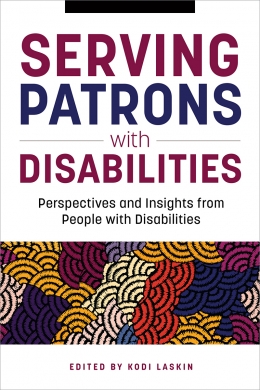Primary tabs
You don't need to be an ALA Member to purchase from the ALA Store, but you'll be asked to create an online account/profile during the checkout to proceed. This Web Account is for both Members and non-Members.
If you are Tax-Exempt, please verify that your account is currently set up as exempt before placing your order, as our new fulfillment center will need current documentation. Learn how to verify here.
- Description
- Table of Contents
- About the author
- Reviews
Incorporating lessons learned from personal experiences of people with disabilities, this guide shares actionable advice on steps to make your library as accessible as possible to all patrons regardless of ability.
Ensuring accessibility is more important than ever; however, answering questions of what needs to be done and why to make a library accessible can be an uncomfortable and daunting hurdle to true inclusion. This book is a safe, nonjudgmental tool for overcoming this awkwardness, offering readers practical, to-the-point information and guidance that complies with the Americans with Disabilities Act (ADA). Its contributors showcase real-world stories and viewpoints that illustrate ways to provide excellent customer service and a safe environment to all patrons regardless of ability. Readers will learn about
- bridging the gap between people with disabilities and those without, through empathy, patience, and understanding;
- techniques for training staff and overcoming discomfort;
- making your library accessible for people with mobility issues;
- how to interact with and assist a person with limited sight or hearing;
- guidance for interacting with a service animal handler;
- advice on library programming for people with learning differences; and
- best practices for effective service to patrons who use a speech assistance device.
Introduction: Disability Is Not a Bad Word, by Kodi Laskin
Chapter 1 Service Animals
Kodi Laskin
Chapter 2 Mobility Aids
Leah Keevan
Chapter 3 Speech Assistive Technology
Jackie Kruzie
Chapter 4 Blindness and Low Vision
Katherine Schneider
Chapter 5 Deaf and Hard of Hearing
Cecelia James
Chapter 6 Learning Differences
Alex Kerr
Conclusion: Communication Is Key, by Kodi Laskin
About the Contributors
Index
Kodi Laskin
Kodi Laskin, a graduate of Rollins College, has used her unique position as both a library assistant and a service animal handler to develop a training geared for libraries and businesses to learn about laws regarding service animals and their place in society. It is available through SEFLIN and NEFLIN. Laskin and her service animal, Piper, can still be found frequenting any and all libraries they come across.
"Offers simple, up-to-date information tailored to library professionals ... Although geared to library workers, this powerful and effective book can be used by anyone working with the public. Required reading for all library professionals."
— Library Journal
"Packs in a remarkable amount of helpful advice on improving library service for disabled patrons ... The brevity of the chapters and the focus on specific disabilities makes this a good choice for professional development reading groups and as a supplemental text for library instruction courses."
— Booklist
"The book is easy to read and understand by people from all contexts. The interesting quotes from real-life stories, supported with relevant textual imagery to corroborate examples, can apply to all settings across the globe. Whether you want to be effective in serving disabled patrons in your library or achieve progress in teaching disabled people how to read and learn, you need to read this book. You will tremendously improve your experience in relating to people having different abilities."
— Journal of the Australian Library and Information Association



